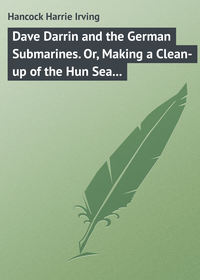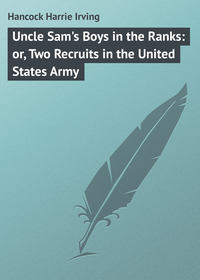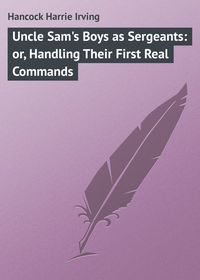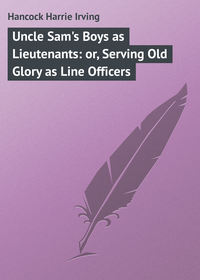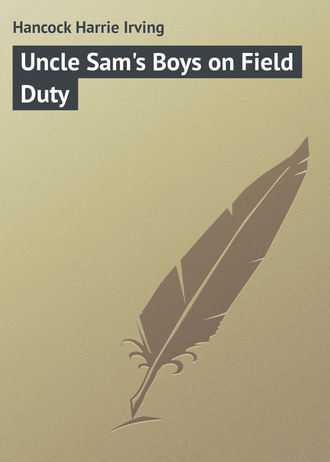 полная версия
полная версияUncle Sam's Boys on Field Duty
At the end of two hours the national guardsmen were still perspiring over their tasks of pitching camp.
The regulars, cool and wholly at ease, were going about other camp duties.
"Look at the amateurs over yonder," grinned Corporal Noll Terry, calling his chum's attention to the brigade of national guardsmen.
"Poor fellows, it's a good deal like work for them," remarked Hal. "They're not drilled in this thing all the time."
"They go about it like so many clowns," laughed Noll.
"Now, I wouldn't say that," urged Corporal Hal. "Remember, the national guardsmen do other things for a living, and do this work for love of state and country."
"But why do they need to be such boobs about pitching a camp?" demanded Noll.
"Because it isn't their accustomed business," Hal retorted.
"Bosh! The tin soldiers make me tired," laughed Corporal Noll.
"Then you want to change your attitude," warned Hal, "for you've got the wrong view, old fellow. There probably isn't a man over in that militia brigade who wouldn't make a smart enough regular if he enlisted."
"Now, I don't know about that," argued Corporal Noll seriously.
"I can remember the time, not very long ago, Noll, when you and I were greener than any militiaman over yonder."
"We were green," admitted Corporal Terry, "but not green in the same way that those state troops are. Some how, regulars and militiamen are quite a different proposition from the very first day."
"True," agreed Corporal Hal. "But what makes the difference?"
"Well, what does?"
"The difference in officers, and in the methods that can be used. Militia officers have to make soldiering the study of their leisure hours, just as the guardsmen in the ranks do. Our regular officers are first given a hard training, and then make a life study of soldiering. Keep those guardsmen in camp for three months, and put regular officers over them all the time, and I tell you, Noll, they'd make most of us regulars look hard to our laurels."
"I don't know," muttered Corporal Terry dubiously.
"Then you want to think it over," retorted Hal. "Just remember that regulars and militiamen are both enlisted from the people at large. Put any militia regiment in the country through a regulation three-years' enlistment in the Army and under regular officers, and that militia regiment would then be the equal of any regular regiment in the line. Noll, the whole difference lies in officers, opportunity and training. Don't ever look down on national guardsmen unless you want to prove yourself less of a soldier than I think you are."
"Corporal Terry!" summoned Sergeant Gray, and Noll hurried off to some new duty, but he was thinking. Corporal Hal had shown him how to look at the national guardsmen from another point of view.
The day was one of arduous duties, but with nightfall came a period of rest. More, some of the regulars in each company, troop or battery were granted town leave. There was a trolley line near at hand that carried many a pleasure-loving regular into town.
Corporals Overton and Terry went by themselves.
"As we have never seen Denver, I guess it will be about enough for us to look around and see what we can of the town, won't it?" proposed Hal.
"Yes; if we keep to the main streets. I feel as though I may want to squander a bit of my pay on ice cream and such frothy trifles," returned Noll.
"We won't spend it, anyway, on anything that will make us forget the limits of our leave and turn delinquents," returned Hal.
"Small danger of that," retorted Corporal Terry. "That game doesn't go with the making of good soldiers."
"I don't believe Captain Cortland will have any delinquents to deal with this time," predicted Hal. "He doesn't intend to have the Mason City business done over again."
Denver proved full of delights to these soldier boys, who had really seen very little of the world.
But, being under orders to return to camp not later than midnight, the time came when they must think of getting back.
"I wonder what's the quickest way to the trolley line?" pondered Noll.
"We'll ask our way," Hal answered.
They had no trouble in getting clear directions from a passing citizen. The shortest way led down through a narrow street that appeared to belong to a rough part of the city.
"I wouldn't care to live on this street," smiled Noll.
"Hardly," agreed Hal. "Yet I guess it won't hurt us any just to walk through."
Ere the soldier boys had gone more than two blocks their attention was attracted by sounds of a commotion in a crowd just ahead.
A crowd had started to collect, and was every moment increasing in size.
"Wonder what's up?" murmured Noll Terry, as the soldier boys quickened their pace.
"Some earthquake in the under world, I suppose," returned Hal.
Just then the scream of a woman's voice reached them.
"Shame! shame!" cried half a dozen male voices in protest.
Then the same voice sounded, in sobs this time.
Hal Overton had broken into a run, and Noll was almost at his side. The soldier boys pushed their way into the crowd.
A brutish, square-jawed young fellow of twenty-one or twenty-two, dressed loudly, and with an ill-smelling cigar between his teeth at one side of his mouth, held a sobbing girl by the wrist.
"Cut out the boo-hoo story, Lizzie, and come along with me to the dance," he ordered gruffly.
"I don't want to go," faltered the terrified girl. "You know well enough, Bill, that my mother don't want me going to dances with you."
"What's your old woman got against me?" demanded the young brute.
"You know well enough, Bill, that mother don't like you, and that she'd sooner see me dead than running around with you."
"She won't have her wish to-night, then, Liz. You're going to waltz with me. You know that wot I say goes, and it's the hop for yours to-night."
"Shame!" cried some one back in the crowd. "Let the girl go home."
"Mind your own biz," growled back the bully, "or I'll step over there and make some changes in yer style of face."
Evidently Bill was known as an ugly customer. Close to him, on the other side from the girl, stood another man, somewhat older and exhibiting the promise of even more brute strength. Plainly he stood by to back Bill up against interference that the crowd might want to attempt. The pair of bullies were such as a city crowd usually doesn't care to risk meddling with.
"Wipe off the boo-hoo, Lizzie, and come along," ordered the fellow who held the girl's wrist. "No use of making a fuss. You're headed for the waltz with me."
"Shame!" some one in the crowd had courage enough to utter again, as Bill, still holding the girl's wrist, started to force her along the sidewalk.
"What do you more decent people expect to do by just talking?" Corporal Hal Overton demanded angrily.
"Hullo, brass-button boy!" called Bill cheerily, turning and leering at the youthful-looking corporal. "When did you blow out of the sewer?"
"If that young lady wishes to go home, let her do so," ordered Hal sternly.
"So?" queried Bill mockingly. "But maybe that won't suit me."
"Then let go of the young lady's wrist, for you'll need both hands up in front of you," warned Hal, springing forward, his hot blood flushing his face with righteous anger.
"Get out, ye tin-soldier militiaman!"
"If it makes any difference," retorted Hal, "we happen to be regulars."
"No difference at all," the young brute leered. "I eat both kinds!"
"Let go that young lady's wrist!"
"Sure!"
Bill did so, and the girl shrank back through the pressing crowd. But Bill aimed a crushing blow at Corporal Hal Overton.
Hal wasn't just on the spot to receive it. But the next instant he and Bill were exchanging hard blows at a rate that made the crowd yell with delight.
"Go it, Bill! Go it, buttons!"
Bill's tough friend reached out to hit Hal from the side. Corporal Noll jumped in, throwing up the fellow's arm. There were two real fights on now.
How it would have ended it would be impossible to say. Strong, daring and skilled though they were, the soldier boys might have been beaten by superior strength.
But a heavy, blue-coated figure darted in, scattering the combatants. Then a Denver policeman gripped both Hal and Noll by the collar.
"Stop it! Stop, I tell ye!" ordered the policeman gruffly.
"Ye've got good game there, Johnson," called out the fellow Bill. "They're a nasty pair of brass buttons. They insulted my girl, and then pitched into me and my friend."
"I'll run these soldier-loafers in, Bill," agreed the policeman. "We've got too many of these soldier-loafers in the country. It's time for some of 'em to learn something."
For Bill and his friend were a pair of amateur thugs who were most useful to the ward's ruling political machine. Bill and his friend were often extremely useful in cleaning out hostile primaries, and in other dirty work incidental to city politics.
"Officer!" protested Corporal Hal.
"Shut up, ye loafer!" ordered the policeman.
"But this is – "
"Will ye shut up, now?"
The policeman gave the soldier boy a vigorous shaking.
"The soldiers were in the right of it, Johnson," protested a voice in the crowd.
"Now, can yer gab, or I'll run you in, too," warned Johnson hoarsely. At that dread warning opposition died out in the weak-kneed crowd.
"Now, come along, ye young loafers in brass buttons," commanded the policeman. "Bill, you and your friend be in court in the morning."
"Sure we will," chuckled Bill.
"Officer, will you let me explain?" insisted Hal, as the two young corporals started down the street on either side of the policeman, who kept a rough grip on the arm of either.
"Pickle it, and tell it all to the judge in the morning," retorted the policeman gruffly.
Some of the crowd – Bill's friends, evidently – followed, hooting and abusing all soldiers in general.
Four blocks away Hal and Noll were lined up before the officer in charge at a station house.
"Assaulting Bill Dabner and his friend and insulting Bill's girl," announced Policeman Johnson gruffly.
"I hope now, sir, we can have a chance to explain," protested Hal, looking squarely at the officer behind the desk.
"Did you see all this business, Johnson?" asked the officer at the desk.
"Yes," lied the policeman glibly. "I caught 'em at it."
"You men can save your explanations for the judge in the morning," wound up the officer at the desk. "Cell number twelve, Johnson."
Down below the cell door clanged on two white-faced, angry young soldier boys. It was a serious thing, they knew, for ambitious soldiers to have a clash with the civil authorities.
"We'll lose our corporal's chevrons through this," Noll predicted.
"Yes," assented Corporal Hal Overton, his eyes flashing. "But I can't help it if we do. It's worth that price to be a man!"
CHAPTER XXII
TWO YOUNG CORPORALS SEND OUT THE "C. Q. D."
WHEN the two young corporals had had time to cool down somewhat, Hal made a racket on his cell door until a house policeman came to see what was wanted.
"Will you bring me paper and an envelope?" Hal asked.
"Want to make your will, I suppose," jeered the policeman.
"No; I intend to write a note to my company commander."
"Is he out at camp?"
"Yes."
"Who do you think is going to take the note out there?"
"Call a messenger boy, and I will pay him for going out there," Corporal Hal replied.
"I don't believe the lieutenant at the desk will do it," returned the policeman.
"See here," Hal went on, warming up perceptibly, "we are members of the United States forces, under detention by the civil authorities. Now, the civil authorities have full right to arrest United States soldiers on proper charges. We'll let the question pass of whether we've been properly arrested. But, as members of the United States Army, we have a right to communicate with our commanding officer. If this isn't done, the governor of Colorado is quite likely to hear from Washington. Now, we demand paper and envelope, and also that a messenger boy be called to take our letter."
"I don't know what the lieutenant will say – " began the house policeman dubiously.
"Of course you don't," Hal broke in. "So go and find out what he says, won't you? And you might explain to him my version of what is likely to happen if he fails to give us a chance to communicate promptly with Captain Cortland."
Twenty minutes passed.
"They're just laughing at us," muttered Noll.
"Then in the morning they may find where the laugh really belongs," Hal retorted.
"Hush! Here comes some one."
It was the house policeman, returning with stationery and a messenger boy.
Taking a pencil from one of his pockets, Hal wrote at some length, though he tried to make his letter as brief as possible.
"Got any matches, boy?" Hal asked of the waiting messenger.
The boy passed a small box in through the grating of the door.
"Here, stop that!" warned the policeman, though he reached forward too late to stop the passing of the matches.
"You shall have them back in a moment," Hal promised the boy.
Drawing a piece of sealing wax from another pocket, Hal lighted a match, dropping the hot wax over the flap of the envelope.
"Here, you can't do that," warned the house policeman, who, however, could get the cell door key only by going upstairs to the desk.
"But I've already done it," smiled Hal.
Noll handed his chum a signet ring, which Hal pressed into the wax.
"That won't go," muttered the policeman. "The lieutenant won't have it. He has to see all letters that go out of this station."
"Then let your lieutenant break the seal, or interfere in any way with the prompt delivery of an official communication between a member of the United States Army and his commanding officer, and see what will happen to your lieutenant upstairs. If the lieutenant is a friend of yours you might call that little point to his attention," Hal retorted, with a cool smile, as he passed the envelope to the messenger.
"How much will it be to deliver that letter promptly out at the camp?" Corporal Overton inquired.
The messenger boy named the sum, to which Overton added carfare and a little "tip."
"As quickly as you can, please, boy. And report to your manager in case the lieutenant, or any other policeman attempts to hinder or bother you on this work. We shall want your report as evidence if you are interfered with."
"Say, that kid corporal downstairs knows all his rights," declared the house policeman admiringly to the lieutenant, after the messenger had departed unmolested.
"He'll forget a large part of what he knows, after he's been before the judge in the morning," replied the lieutenant, lighting a cigar. "Soldiers, as well as citizens, can be punished, and Johnson has a clear case against that pair of soldier kids."
For the next two hours Hal and Noll took turns pacing back and forth within the narrow confines of the cell in which they had been thrust.
"I guess we're not going to hear anything to-night," muttered Hal disappointedly at last. "Noll, we may as well get some of the sleep that's coming to us."
Young soldiers accustomed to sleeping on the ground did not find it extremely hard to get to sleep on the hard wooden benches. More than that, they contrived to get a pretty fair rest before they were awakened in the morning by a station-house trusty who thrust two chunks of bread and two tin cups of coffee into the cell.
"Get that down and be ready to go to court," called the trusty as he passed along.
Breakfast eaten, the two young corporals had a lot more time on their hands before a squad of policemen came downstairs and began to busy themselves with marshaling the prisoners and driving them toward a basement door.
Here, mingled with the scum of the city, in the persons of other prisoners, two unoffending young soldiers of the United States Army were forced to enter the dark interior of a covered wagon. A steel door was slammed into place and locked and the ride began.
In a few minutes they were let out, superintended by a guard of other policemen, and driven into another basement. Here, in a dark, dingy, foul-smelling room, this batch of prisoners was herded with those from other police stations.
A lot of time passed. Occasionally court policemen came into the room, selected more prisoners and drove them out toward a stairway.
At last it came the turn of Corporals Hal and Noll. They were taken from the room, up an iron staircase, and then pushed into the pen of a police court.
"Henry Overton and Oliver Terry!" called a clerk.
"There's yer cue," announced a gruff court policeman, pointing to the two young soldiers. He conducted them to the front of the pen where they stood facing a police magistrate.
The clerk announced the charge against them, then ordered wearily:
"Prisoners, hold up your right hands. You do solemnly swear – "
The two young corporals had been duly sworn to tell the truth.
"Where's the arresting officer?" demanded Judge Guffey.
Policeman Johnson came forward, held up his hand and was sworn.
Then the policeman started to tell the story of what he claimed to have seen. According to this evidence, Noll and Hal had first insulted a young woman with whom Bill Dabner was walking at the time. Bill had naturally resented the insults, and then the soldiers had violently assaulted Bill and his male friend, while the girl broke through the gathering crowd and fled for home.
Then Bill came forward, in his best, loudest clothes, and with his hair much greased. Bill's story, under oath, put a few flourishes to Policeman Johnson's plainer tale. Bill's friend was also there and backed up all that the policeman and Dabner had said.
"We have plenty of other witnesses, your honor, if you desire to examine more," interposed the policeman.
"Where's the young woman herself?" queried Judge Guffey.
"Home in bed, ill from the shock, your honor," Bill asserted gravely.
"Prisoners at the bar, have you anything to say?" queried Judge Guffey. "Overton?"
"I've a lot to say, your honor."
In tones ringing with indignation, Corporal Hal Overton, United States Army, gave his version of the affair. Bill Dabner listened with a broad, impudent grin, as Hal told the true story of the encounter of the night before.
Then Noll spoke in his own behalf.
"I saw the assault myself, your honor, and have other witnesses here for our side if you wish to hear them," said Policeman Johnson.
"This testimony is very much confused," commented Judge Guffey at last. "But the evidence of the police officer is evidently worth that of all the other witnesses combined, for the policeman has no personal prejudices in the matter. Prisoners at the bar, you appear to have forgotten that you were sworn into the Army and enrolled among the defenders and protectors of the country. It is no light thing to insult a young woman, even if she does happen to belong to the poorer classes of society. Prisoners, such conduct as yours, under any circumstances, is a disgrace to the splendid uniform that you wear. Soldier hoodlumism shall find no more sanction in this court than any other kind of rowdyism. I sentence you each, therefore – "
Judge Guffey's voice paused for a moment, as though the magistrate were thinking deeply.
Then he added:
" – to thirty days in the workhouse!"
CHAPTER XXIII
THE WIND CHANGES ITS COURSE AND BLOWS
IT was a dazing, fearful blow to two lads who had acted in accordance with their highest ideals of right.
"Step down there," ordered the court officer, giving the young corporals a light shove.
"You've got yours."
Policeman Johnson, Bill Dabner and the latter's crony turned to leave, as though satisfied that they had done their duty.
At the back of the courtroom there was a slight commotion. Some one there was endeavoring to push his way through the throng.
"Your honor, one moment!" called a deep, manly voice. "Before the case of the two soldiers is disposed of I wish – "
It was some one in uniform at the back of the court room. More Judge Guffey could not ascertain at that moment.
"Who spoke then?" demanded the magistrate.
"My name is Cortland, your honor. I am captain of the company to which the two corporals belong."
At the first sound of that voice Hal and Noll had turned back to the front of the pen.
"Get down below, you!" scowled the court officer.
"Will you be good enough to hold your tongue, my man?" asked Corporal Hal in a quiet voice, though his eyes flashed. "That's our captain speaking, and his is the voice we follow."
"Let the prisoners wait," directed Judge Guffey, sending the court officer an annoyed glance. "Make way for Captain Cortland to come forward."
Policeman Johnson and Bill and his friend were trying to get out of the court room, but the magistrate called to them to come back.
"Captain," continued the magistrate, "I regret to say that the evidence proved that your two men most wantonly insulted a young woman on the streets last night, and then attacked her escort and a friend."
Captain Cortland, as he came to a halt below the bench in that crowded court room, presented a fine appearance that was in distinct contrast with his surroundings.
"With due respect for the court, your honor. I don't believe that any such disgraceful conduct was engaged in by my young men."
"But even the policeman's testimony bears out that of the real complainants, Captain," replied Judge Guffey courteously.
"Your honor, I don't know your policeman, but I do know my two young men, Corporals Overton and Terry. I am as positive as I can be of anything that neither young soldier is of the kind to allow himself to get into any kind of disgraceful affair. There are no men in my company for whom I entertain deeper respect than I do for Corporals Overton and Terry. Your honor, may I ask that this case be reopened?"
"I would gladly extend you that courtesy, Captain Cortland, but the evidence has all been heard. As I understand it, Captain, you can testify only to the previous good character of the prisoners. You were not a witness of last night's occurrence?"
"I was not, your honor, but I know my two young men so well that I feel certain, sir, that you are unwittingly aiding in a miscarriage of justice. Will the court be good enough to outline the nature of the evidence?"
Briefly Judge Guffey outlined the story of the prosecution, and also the opposed story told by Corporals Overton and Terry.
"Your honor may think me unduly trustful," smiled Captain Cortland, "but I would believe the story of my men over the testimony of a hundred men such as these complainants seem to be."
Captain Cortland took a side look at Bill and his friend, who unaccountably shivered under that scrutiny.
"Has the young woman herself appeared in court, your honor?" resumed B Company's captain. "Has she testified?"
"I understand," replied Judge Guffey, "that the young woman is ill in bed as a result of the shock of last night's occurrence."
"Then, your honor," asked Captain Cortland, "may I ask a continuance of this case until the testimony of the young woman herself may have been heard, and until I can look up other evidence? And will you accept my personal bail for Corporals Overton and Terry in the meantime?"
"I want to show you every courtesy possible, Captain," began Judge Guffey.
"And I ask nothing, your honor, except that my men have every opportunity for impartial justice."
While this conversation had been going on an extremely mild-mannered man in rather dingy black, had been quietly working his way forward. He had just succeeded in passing a card to the clerk of the court and in adding a few whispered words.
"Your honor," interposed the clerk, "here is another witness who offers, and wishes to be heard. He can bring us tidings of the young woman who has been mentioned in connection with this case."
Judge Guffey took the card, reading from it:
"Dr. Alexander McKenzie."
"That is my name, sir," replied the quiet man.
"What do you know of this case, Doctor?"
"Not much, sir, but it may be important," replied the physician. "I was called in this morning by the mother of one Lizzie McAndrew, the girl mentioned in this affair. Miss McAndrew is quite ill this morning, as the result of a nervous shock, but her mind is clear enough. She begged me particularly to come to court to see that two brave and gallant young soldiers did not come to harm through befriending her."


